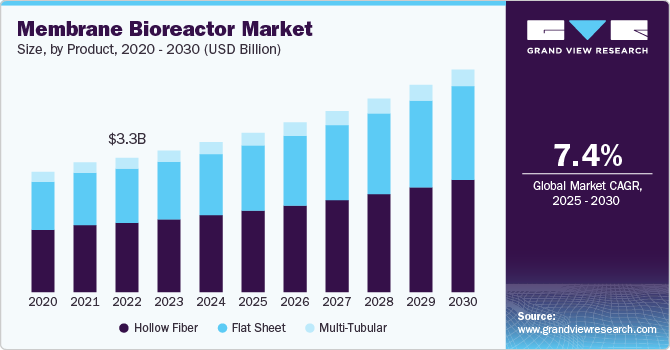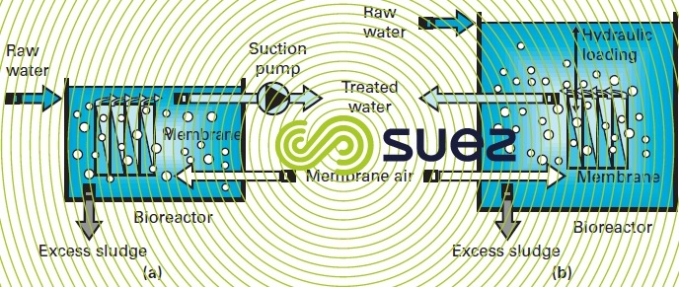Membrane Bioreactor as a Sustainable Solution for High-Volume Wastewater Treatment
Membrane Bioreactor as a Sustainable Solution for High-Volume Wastewater Treatment
Blog Article
Just How Membrane Bioreactors Are Changing Water Purification Equipments
The development of membrane bioreactors (MBRs) represents a considerable development in the field of water purification, merging biological therapy procedures with sophisticated membrane layer purification innovations. As worldwide water shortage heightens, the function of MBRs in helping with potable water reuse and sustainable water monitoring comes to be significantly important.
Introduction of Membrane Bioreactors
Membrane bioreactors (MBRs) stand for a substantial improvement in water purification technology, as they integrate biological therapy procedures with membrane layer purification. This integration boosts the efficiency of wastewater therapy by making use of microorganisms to degrade organic pollutants while at the same time employing semi-permeable membranes to different cured water from put on hold solids and virus.
The MBR system normally contains an organic reactor where the microbial populace metabolizes pollutants, adhered to by a membrane layer filtration device that keeps biomass and allows just clean water to travel through. This dual capability leads to greater effluent high quality contrasted to traditional therapy techniques. MBRs can be run in both batch and continual flow modes, offering versatility in design and application.
They likewise allow the recuperation of water for reuse, hence adding to water sustainability initiatives. In general, MBRs are at the center of improving water therapy effectiveness and top quality, showcasing the possibility for innovative services in environmental administration.
Benefits of MBR Modern Technology
The assimilation of organic therapy with membrane layer purification supplies numerous advantages for water purification procedures. Among the key advantages of Membrane layer Bioreactor (MBR) modern technology is its capacity to properly get rid of both not natural and natural pollutants, causing top notch effluent. The membrane layers function as a physical barrier, stopping suspended solids and pathogens from passing through, which enhances the total safety and security and dependability of treated water.
Additionally, MBR systems require a smaller sized impact compared to conventional therapy techniques, enabling extra effective area utilization. This small style is particularly useful in city settings where land is restricted. MBRs additionally demonstrate functional versatility, fitting differing influent top qualities and flow prices without considerable performance destruction.
Moreover, the process supplies improved nutrient elimination abilities, particularly for nitrogen and phosphorus, which are critical for stopping eutrophication in receiving waters. The lowered sludge production related to MBR innovation also equates to lower disposal expenses, making it an affordable solution in the lengthy run - Membrane Bioreactor. Overall, the benefits of MBR modern technology setting it as a leading selection for sustainable and ingenious water purification systems, attending to both ecological and economic worries
Applications in Water Purification
Applications of Membrane Bioreactor (MBR) modern technology in water purification are diverse and impactful, attending to various therapy requires throughout multiple fields. MBRs effectively integrate biological therapy procedures with membrane purification, making them ideal for municipal wastewater treatment, commercial effluent management, and also potable water reuse campaigns.
In metropolitan setups, MBRs are increasingly employed to enhance the quality of treated wastewater, enabling compliance with strict discharge guidelines and assisting Visit This Link in the recycling of water for watering and non-potable usages. Their compact style likewise makes them appropriate for metropolitan atmospheres where area is limited.
Industrially, MBR innovation is utilized to treat procedure water and wastewater, specifically in fields such as food and drink, drugs, and fabrics. By efficiently eliminating contaminants and suspended solids, MBRs help sectors decrease ecological effects while recuperating important resources from wastewater streams.
In Addition, MBRs are obtaining grip in decentralized water treatment applications, where small-scale systems can be released in remote locations or developing areas. This flexibility allows neighborhoods to achieve lasting water administration services, enhancing accessibility to clean water while reducing look at this website dependence on standard treatment approaches.
Study and Success Stories

In an additional instance, a fabric production center in Bangladesh took on MBR innovation to address its wastewater challenges. The system reduced chemical oxygen demand (COD) degrees from 1,200 mg/L to less than 100 mg/L, therefore meeting governing standards and dramatically lessening ecological effect.
The College of Cape Town's MBR setup has actually shown reliable in treating greywater for non-potable reuse on school. This task not only preserves potable water however additionally acts as an academic version for sustainable methods.
Furthermore, a fish and shellfish processing plant in Norway used MBR modern technology to treat effluents including high degrees of raw material, accomplishing over 90% toxin elimination. These study emphasize MBR modern technology's flexibility and its important function in boosting water top quality across diverse applications.
Future of Water Treatment Solutions
As worldwide water deficiency and air pollution challenges magnify, ingenious water therapy remedies are coming to be increasingly vital to make sure lasting accessibility to tidy water. The future of water therapy exists in the you could try this out assimilation of innovative modern technologies that boost the performance and performance of filtration procedures. Membrane layer bioreactors (MBRs) go to the center of this advancement, incorporating organic therapy with membrane filtering to create premium effluent appropriate for different applications.

Emerging patterns such as resource healing from wastewater, including nutrients and energy, will further transform therapy facilities right into eco-friendly centers. Advancements in nanotechnology and membrane layer products guarantee improved efficiency and durability of filtration systems.

Final Thought
Their role in potable water reuse and lasting water monitoring highlights their importance in attending to international water scarcity challenges. Proceeded study and development will even more improve the efficiency and fostering of MBR technology, guaranteeing a durable future for water therapy remedies.
The emergence of membrane bioreactors (MBRs) represents a considerable improvement in the area of water filtration, combining organic therapy procedures with sophisticated membrane filtering modern technologies. As global water deficiency magnifies, the role of MBRs in helping with drinkable water reuse and sustainable water administration ends up being progressively vital. They likewise allow the healing of water for reuse, therefore contributing to water sustainability initiatives.As global water scarcity and pollution challenges intensify, cutting-edge water therapy remedies are ending up being progressively vital to guarantee sustainable access to tidy water. Their duty in drinkable water reuse and sustainable water management highlights their relevance in resolving worldwide water shortage challenges.
Report this page